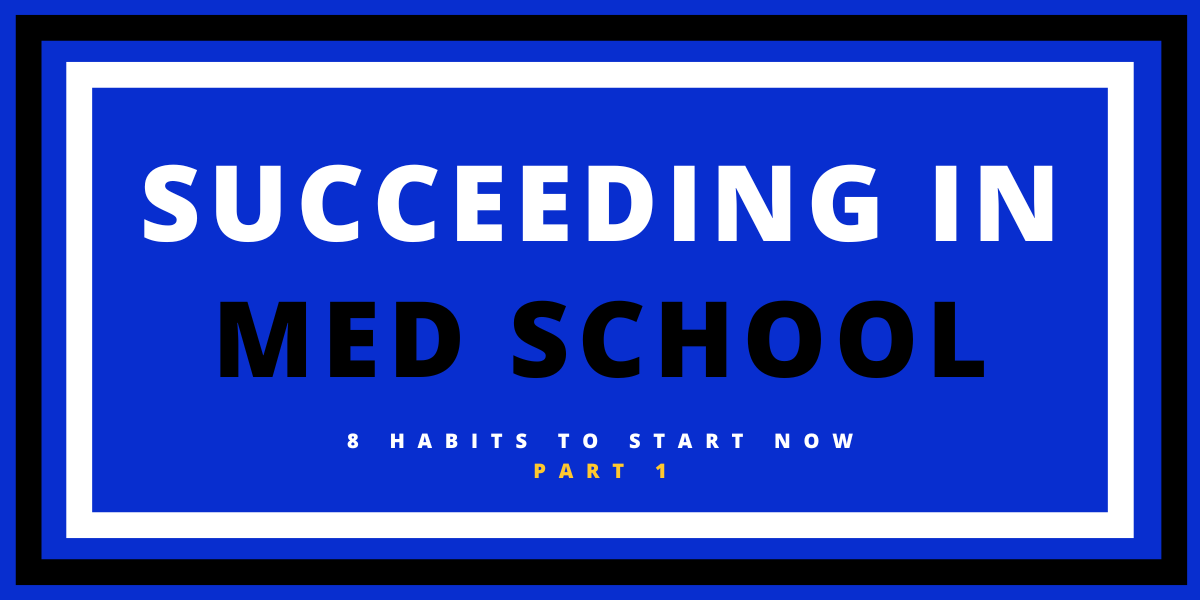8 Pre-Med Habits That Will Help You Shine in Medical School ✨ PART 1
Vested
🗣️Most people planning to apply to medical school are already excellent students – highly motivated, hard-working, persistent through obstacles. But what helps you really stand out – and prepares you to thrive once you’re there? In this post, I’ll chat about some of the habits I built that served me well leading up to, during, and after medical school.
1. Make use of the time you have; something is better than nothing.
In high school and undergraduate classes, you may have enough time to wait to tackle big tasks or projects when you have a big chunk of time to do so – at the end of the day, after classes, etc. In medical school, life gets a lot busier! As you’re trying to learn the numerous quantities of information coming at you, making the most of the small bits of time you have there becomes increasingly important. A 20-minute train or bus commute can be a great opportunity to squeeze in some practice questions or read your prep materials; 5 or 10 minutes between classes or commitments is enough time to do some flashcards or watch a video. Remember – something is better than nothing! If you can only do 3 study questions or 15 minutes of studying on something each day, that is better than no questions and no studying – and that will add up to a LOT of studying over time. Make the most of the time you have, and remember that whatever you’re able to squeeze in is worthwhile.
2. Find active learning techniques that work for you.
Hopefully, you are already aware of the differences between active and passive learning, and as you head toward medical school, it is important to identify and prioritize active learning strategies that work for you. This is important in college, when studying for the MCAT, and will continue to remain important throughout and beyond medical school! As you strive to make the most of the time you have, aim to do so with active learning techniques that challenge you and encourage information to really stick in your brain. By definition, these techniques are often harder, more tiring, and generally more cognitively challenging. But that’s what makes them effective! Maybe you like to get together with a classmate and explain concepts or quiz one another; maybe you like to look up questions or self-quiz, or create concept maps. Whatever it is, strive to make it a more active technique than something like re-reading notes – you want to really challenge yourself, and force your brain to retrieve the information you’ve packed away. The more you practice retrieving that info, the easier and more natural it will become. Medical school requires you to take in and retain a lot of new information – as you begin to prepare for that, learning how to learn actively and efficiently is essential.
3. Wake up early!
Night owls do exist among medical students – and if that’s you, that is okay! That said, as a morning person, I have always found waking up early to be an almost foolproof strategy for getting more done and better managing my time throughout the day. Just don’t sacrifice sleep! Sleep is incredibly important for learning, wellness (see the next tip!), and sustaining yourself throughout medical school. All of that said, waking early can mean you get a few things done before the day gets hectic, and before your brain is distracted by new and accumulating tasks to add to the list. Combining this with the something is better than nothing tip – it doesn’t have to be a lot! You could wake up and do a few questions or do some reading before you head to classes and receive new assignments. Keeping that up in medical school will serve you very well– and if you end up in a surgical specialty like I did, you’ll thank yourself later for adjusting to early mornings!
4. Prioritize well-being.
Wellness and burnout are increasingly common topics among medical professionals – and for good reason! Building good habits now to support your wellness will help to sustainably thrive throughout medical school and beyond. Don’t overlook the basics – sleep, exercise, hydration, and good nutrition can all have a big impact on your physical and mental well-being. Medicine can be an all-consuming pursuit sometimes, but making sure that you make time for friends, hobbies, and activities you enjoy can help you ensure you’re able to bring your best self to class or the hospital each day. Setting boundaries can be healthy, and saying no to something doesn’t make you a failure – it just means you’re protecting yourself so you can shine in the things you say yes to. You’re entering a field centered around caring for others – start by making sure to care for yourself!
